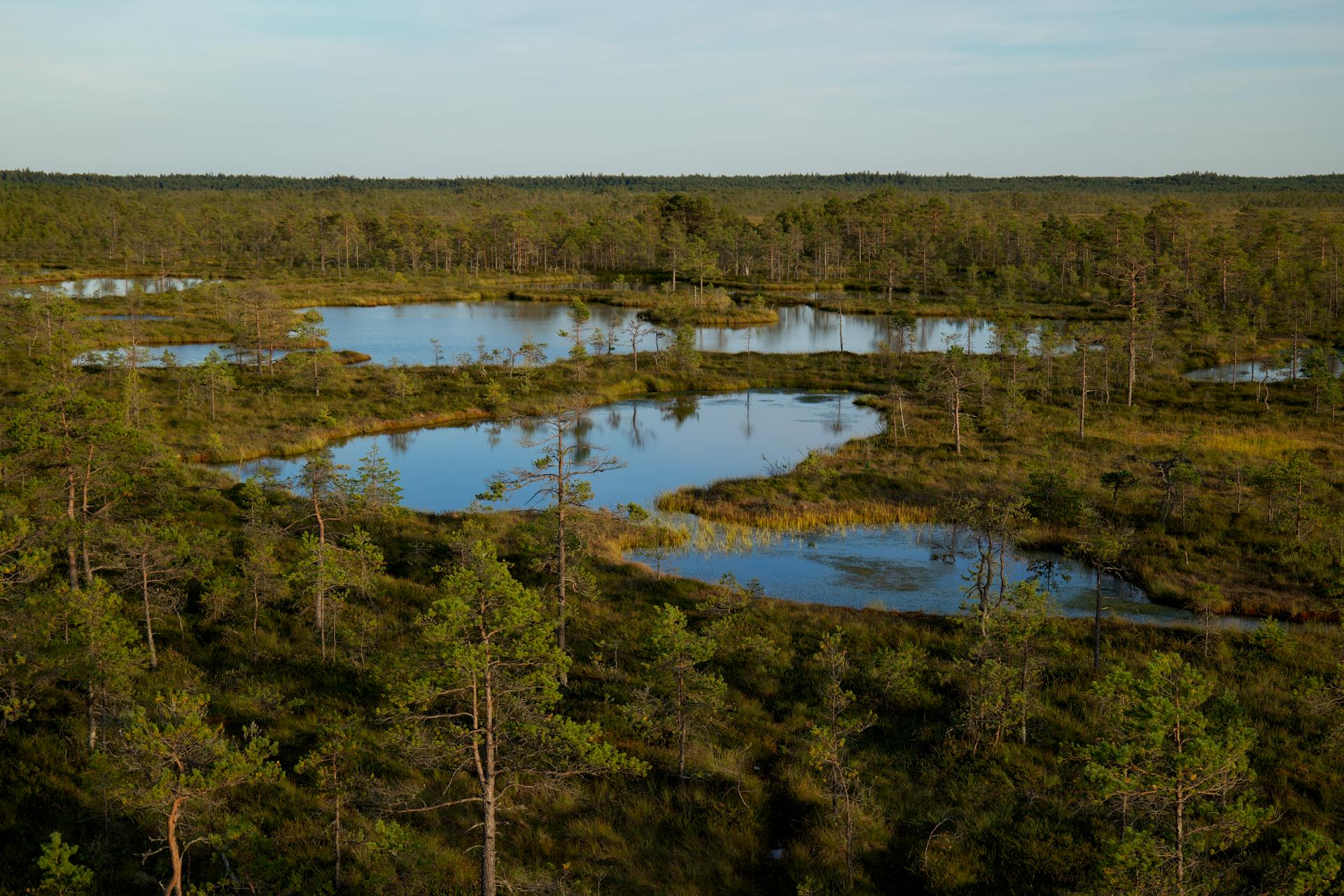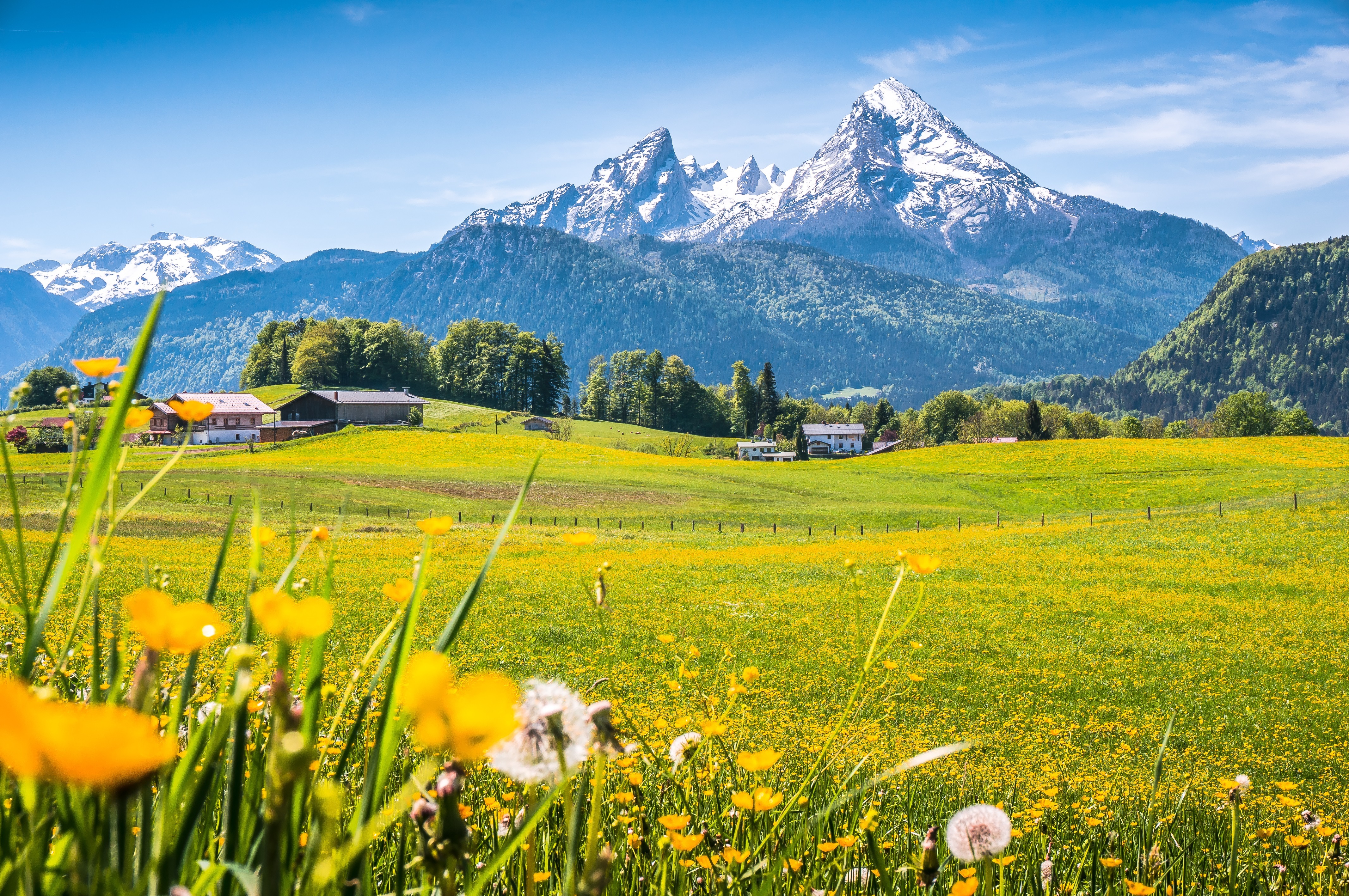New solutions to address the global water crisis jointly with the climate change challenge will bring benefits to numerous sectors and the social realm. The just-released UN World Water Development Report 2020 shares knowledge and concrete proposals to make the most of the complex Water–Climate–Energy–Food–Environment Nexus, for a more informed World Water Day celebration.
Every year, in conjunction with the World Water Day celebrations, the United Nations publishes their World Water Development Report. The flagship report, coordinated by the UNESCO World Water Assessment Programme, focuses on a different theme linked to water each year and provides decision-makers with knowledge on how to formulate and implement sound water policies. The 2020 edition of the report (WWDR 2020) focuses on “Water and Climate Change” and provides a comprehensive overview of existing interlinkages between the two themes in the broader context of the 2030 Agenda for Sustainable Development.
A triple-win proposal
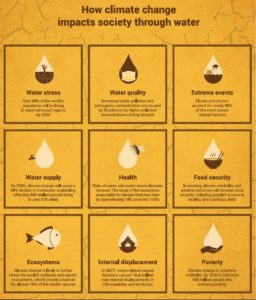 Combining climate change adaptation and mitigation, through water, is a triple‐win proposal that benefits the water sector, climate change action, and many other global sustainability objectives at the same time.
Combining climate change adaptation and mitigation, through water, is a triple‐win proposal that benefits the water sector, climate change action, and many other global sustainability objectives at the same time.
This is one of the main messages of the report, which highlights the importance of strengthening efforts to tackle both issues at an international policy level: indeed, water could play a connecting role across the Sustainable Development Goals (SDGs) of the 2030 Agenda and across policy frameworks such as the Paris Agreement and the Sendai Framework for Disaster Risk Reduction. This role is not well understood yet, as about two-thirds of Nationally Determined Contributions (NDCs) under the Paris Agreement identify water as a priority, but only a few of them include concrete actions and projects.
By shifting the focus to the high potential of better water management for reducing GHG (greenhouse gas) emissions, and on the contribution it could bring to climate change adaptation and disaster risk reduction, the water community could benefit from climate funds, that constitute an opportunity to provide additional financing for addressing the water crisis.
Water does not need to be a problem – it can be part of the solution. Water can support efforts to both mitigate and adapt to climate change.
Director-General of UNESCO, Audrey Azoulay
Climate action will benefit the water sector
Sustainable Development Goal 6 of the 2030 Agenda calls for ensuring availability and sustainable management of water and sanitation for all by 2030. Today, 2.2 billion people still do not have access to safely managed drinking water, and 4.2 billion (the 55% of the world’s population), are without safely managed sanitation. According to the Report of the UN Secretary-General Special edition: progress towards the Sustainable Development Goals, achieving universal access to even basic sanitation services by 2030 would require doubling the current annual rate of progress.
As reported in the WWDR 2020, this context is exacerbated on the one hand by the increasing water demand, which is rising by about 1% a year (after a sixfold increase over the past century), and on the other hand by amplified water stress due to climate change impacts, such as rising temperatures and increasing frequency and intensity of extreme events.
Therefore, considering the interlinkages between climate change and water for implementing joint actions will benefit first of all water resource management and improve the provision of water supply and sanitation services.
Better water management will help climate change mitigation and adaptation
The report highlights how better water management could contribute to mitigating both the causes and the impacts of climate change.
On the side of the causes, improved approaches to the treatment of water, and especially wastewater, offer several opportunities to reduce GHG emissions. Moreover, several climate change mitigation measures directly interest water as a resource, such as water reuse, conservation agriculture, and renewable energies.
With regard to impacts, better water management is crucial when designing disaster risk reduction strategies. For example, structural climate change adaptation measures that can help to address climate impacts through water include enhanced water storage, climate‐proof infrastructure, and crop resilience improvements through the introduction of flood‐ and drought‐resistant crop varieties. Such interventions can be sustained with adaptation policies, including insurance, forecasting, and early warning systems, sound land use planning, and capacity building.
Addressing climate change through water will contribute to other SDGs
The third dimension of the “triple‐win proposal” of UN-Water concerns the direct and indirect contribution that a joint effort on the sectors of climate change and water can bring to reaching the goals of the 2030 Agenda for Sustainable Development. Indeed, beyond SDG 6 (the “water” goal) and SDG 13 (the “climate” goal), many other Goals can benefit from such actions.
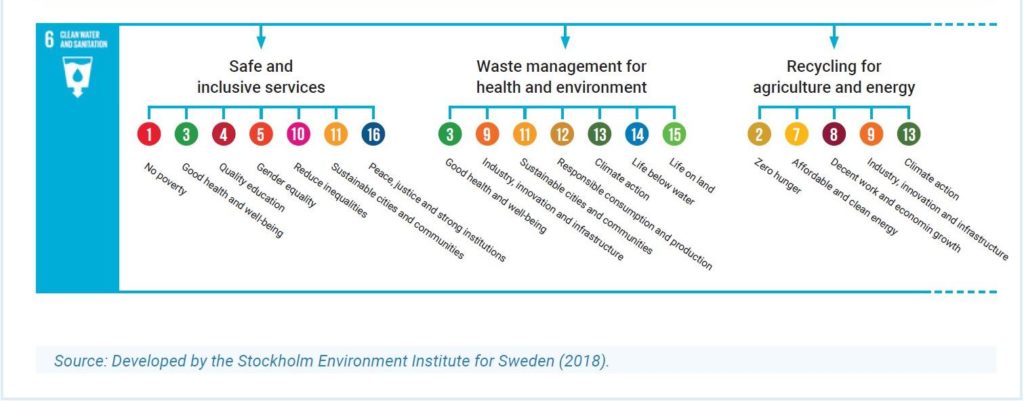
As said, this is not just about water and climate. The nexus is much broader. Chapter 9 of the UN-Water’s flagship report is entitled “Water–Climate–Energy– Food–Environment Nexus” and explains how addressing water and climate change together can benefit all the water‐dependent (and thus vulnerable to the impacts of climate change) sectors: food security, human health, urban and rural settlements, energy production, industrial development, economic growth, and ecosystems.
In particular, reducing water demand should be imperative, as improving water efficiency and water savings in some of these sectors through sound climate change mitigation and adaptation actions can make more water available for the others.
The concrete win-win solutions proposed in the report, addressing this complex nexus, include the following:
-
Energy
Water use requires energy (e.g. for the abstraction, distribution, and treatment of water and wastewater), and energy production requires water (e.g. for growing crops to be converted into biofuels, for mining fossil fuels, and for cooling processes in thermal power generation). The WWDR 2020’s authors call for reducing the energy demand from the water sector through water savings or improved water use and processing efficiency. In order to reduce the quantity of water used by the energy sector, they highlight the importance of improving the diffusion of renewables: wind, solar photo‐voltaic and certain types of geothermal power generation are by far the best alternatives from a water demand perspective.
-
Food and agriculture
Since 69% of global water withdrawals are due to agriculture, targeted actions in this sector can give a substantial contribution to the cause. The report highlights the importance of conservation agriculture, which allows a reduction in water and energy demand thanks to the ability of soils to retain more water, and at the same time brings many additional ecological benefits.
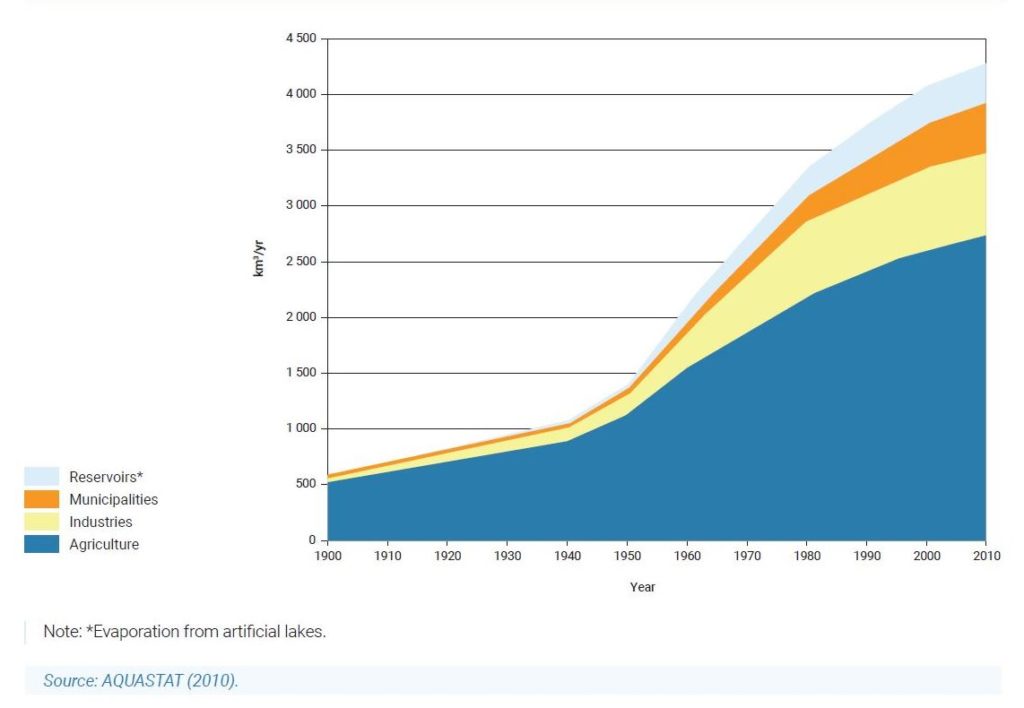
The food sector can also contribute to reducing the water and energy demand (and, thus, GHG emissions) through a reduction of food loss and waste, which today accounts for about 25-30% of the total food produced, and that contributed 8-10% of total GHG emissions between 2010 and 2016.
-
Land use and ecosystems
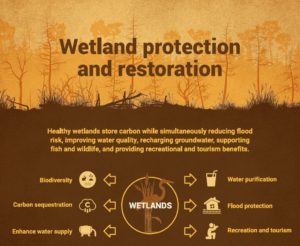 Improving water management for maintaining or rehabilitating healthy ecosystems such as forests, grasslands, and wetlands play an important role both in terms of improving carbon sequestration and enhancing water protection while guaranteeing other ecological benefits. In particular, the report explains, wetlands store twice as much carbon as forests: their restoration is, therefore, a strategy that can improve water quality and decrease flooding, contributing at the same time to the reduction of GHG emissions through CO2 absorption and carbon capture.
Improving water management for maintaining or rehabilitating healthy ecosystems such as forests, grasslands, and wetlands play an important role both in terms of improving carbon sequestration and enhancing water protection while guaranteeing other ecological benefits. In particular, the report explains, wetlands store twice as much carbon as forests: their restoration is, therefore, a strategy that can improve water quality and decrease flooding, contributing at the same time to the reduction of GHG emissions through CO2 absorption and carbon capture.
-
Water supply, sanitation, and wastewater treatment
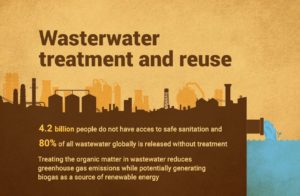 Globally, more than 80% of all wastewater is released to the environment without treatment. But untreated wastewater, with its organic matter, is a source of GHG emissions. Since the wastewater’s organic matter contains more energy than is needed to treat it, recovering the biogas produced from the treatment process can make the treatment an energy-positive process. Moreover, the amount of energy associated with water extraction, treatment or transportation, representing some 4% of global electricity production, could be reduced by reusing untreated or partially treated wastewater.
Globally, more than 80% of all wastewater is released to the environment without treatment. But untreated wastewater, with its organic matter, is a source of GHG emissions. Since the wastewater’s organic matter contains more energy than is needed to treat it, recovering the biogas produced from the treatment process can make the treatment an energy-positive process. Moreover, the amount of energy associated with water extraction, treatment or transportation, representing some 4% of global electricity production, could be reduced by reusing untreated or partially treated wastewater.




